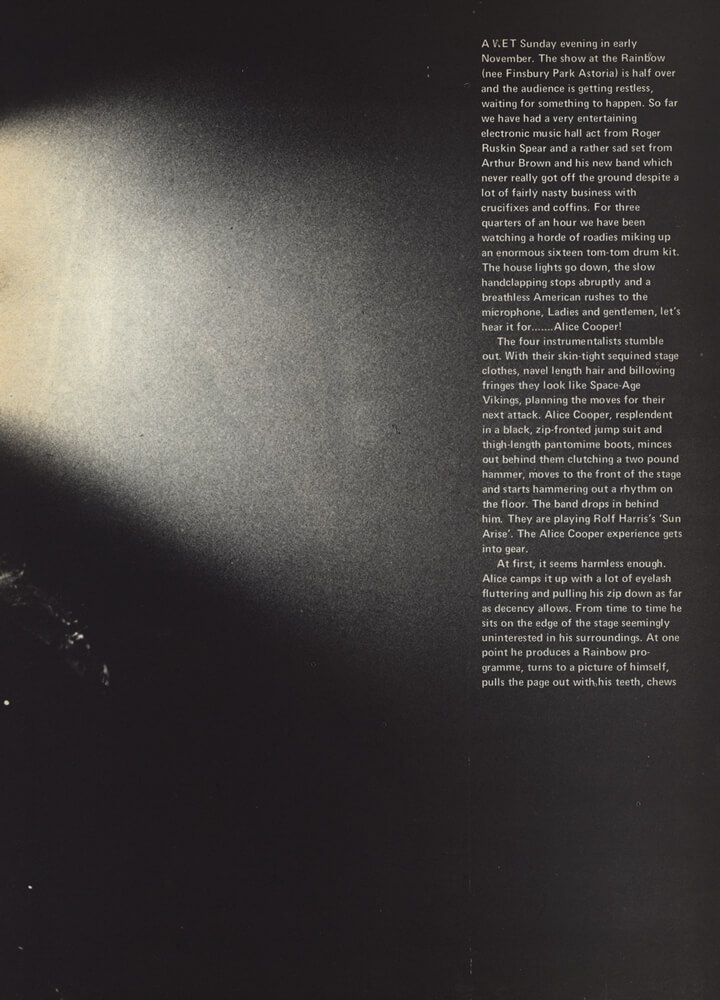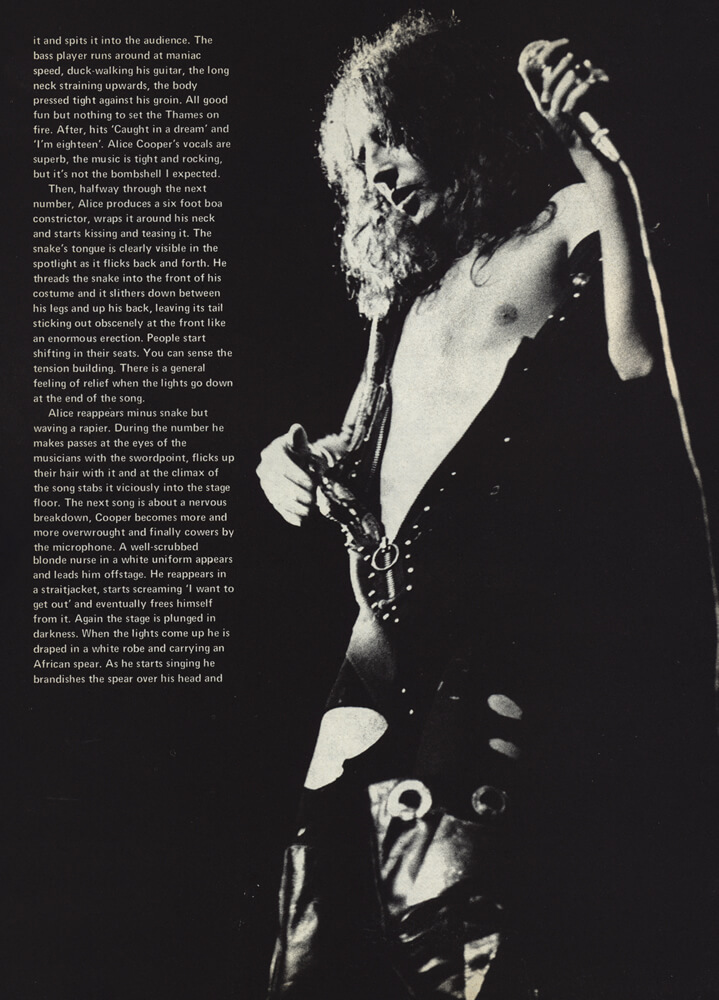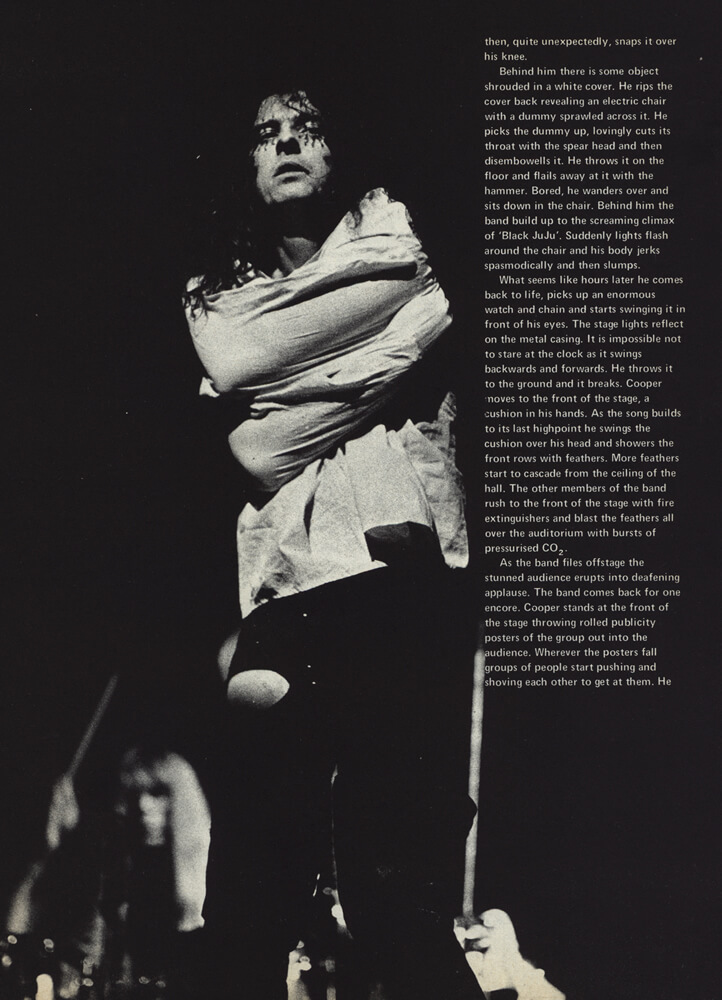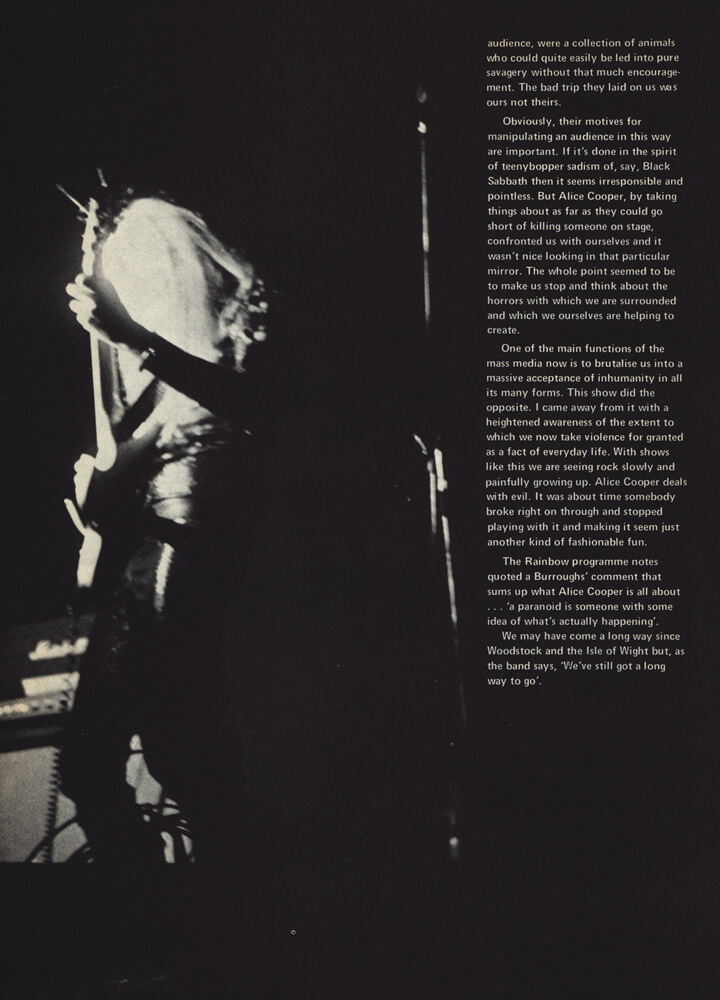Article Database
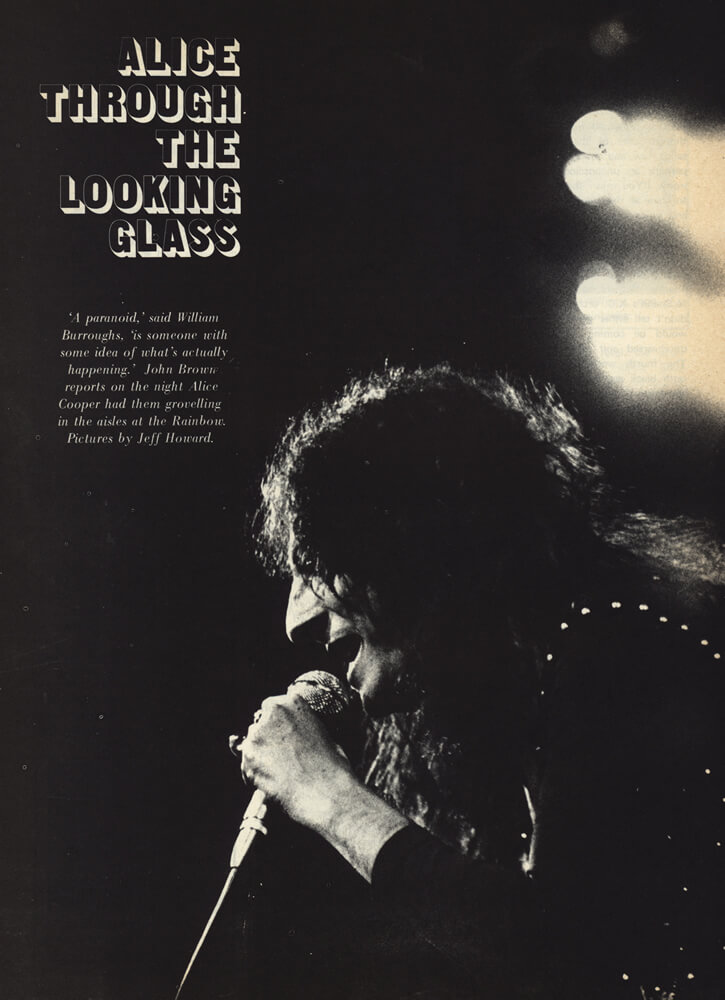
Cream
December 1971
Alice Through the Looking Glass
Author: John Brown
'A paranoid,' said William Burroughs, 'is someone with some idea of what's actually happening.' John Brown reports on the night Alice Cooper had them grovelling in the aisles at the Rainbow. Pictures by Jeff Howard.
A WET Sunday evening in early November. THe show at the Rainbow (nee Finsbury Park Astoria) is half over and the audience is getting restless, waiting for something to happen. So far we have had a very entertaining electronic music hall act from Roger Ruskin Spear and a rather sad set from Arthur Brown and his new band which never really got off the ground despite a lot of fairly nasty business with crucifixes and coffins. For three quarters of an hour we have been watching a horde of roadies milking up an enormous sixteen tom-tom drum kit. The house lights go down, the slow handclapping stops abruptly and a breathless American rushes to the microphone, Ladies and gentlemen, let's hear it for.......Alice Cooper!
The four instrumentalists stumble out. With their skin-tight sequined stage clothes, navel length hair and billowing fringes they look like Space-Age Vikings, planning the moves for their next attack. Alice Cooper, resplendent in a black, zip-fronted jump sit and thigh-length pantomime boots, mines out behind them clutching a two pound hammer, moves to the front of the stage and starts hammering out a rhythm on the floor. The band drops in behind him. They are playing Rolf Harris's 'Sun Arise'. The Alice Cooper experience gets into gear.
At first, it seems harmless enough. Alice camps it up with a lot of eyelash fluttering and pulling his zip down as far as decency allows. From time to time he sits on the edge of the stage seemingly uninterested in his surroundings. At one point he produces a Rainbow programme, turns to a picture of himself, pulls the pages out with his teeth, chews it and spits it into the audience. The bass player runs around at maniac speed, duck-walking his guitar, the long neck straining upwards, the body pressed tight against his groin. All good fun but nothing to set the Thames on fire. After, hits 'Caught in a dream' and 'I'm eighteen'. Alice Cooper's vocals are superb, and music is tight and rocking, but it's not the bombshell I expected.
Then, halfway through the next number, Alice produces a six foot boa constrictor, wraps it around his neck and starts kissing and teasing it. The snake's tongue is clearly visible in the spotlight as it flicks back and forth. He threads the snake into the front of his costume and it slithers down between his legs and up his back, leaving it's tail sticking out obscenely at the front like an enormous erection. People start shifting in their seats. You can sense the tension in the building. There is a general feeling of relief when the lights go down at the end of the song.
Alice reappears minus the snake but waving a rapier. During the number he makes passes at the eyes of the musicians with the swordpoint, flicks up their hair with it and at the climax of the song stabs it viciously into the stage floor. The next song is about a nervous breakdown, Cooper becomes more and more overwrought and finally cowers by the microphone. A well-scrubbed blonde nurse in a white uniform appears and leads him offstage. He reappears in a straightjacket, starts screaming, 'I want to get out' and eventually frees himself from it. When the lights come up he is draped in a white robe and carrying an African spear. As he starts singing he brandishes the spear over his head and then, quite unexpectedly, snaps it over his knee.
Behind him there is some object shrouded in a white cover. He rips the cover back revealing an electric chair with a dummy sprawled across it. He picks the dummy up, lovingly cuts its throat with the spear head and then disembowels it. He throws it on the floor and flails away at it with the hammer. Bored, he wanders over and sits down in the chair. Behind him the band build up to the screaming climax of 'Black Juju'. Suddenly lights flash around the chair and body jerks around the chair spasmodically and then slumps.
What seems like hours later he comes back to life, picks up an enormous watch and chain and starts swinging it in front of his eyes. The stage lights reflect on the metal casing. It is impossible not to stare at the clock as it swings backwards and forwards. He throws it to the ground and it breaks. Cooper moves to the front of the stage, a cushion in his hands. As the song builds to its last highpoint he swings the cushion over his head and showers the front row with feathers. More feathers start to cascade from the ceiling of the hall. The other members of the band rush to the front of the stage with fire extinguishers and blast the features all over the auditorium with bursts of pressurised CO2.
As the band flies offstage the stunned audience erupts into deafening applause. The band comes back for one encore. Cooper stands at the front of the stage throwing rolled publicity posters of the group out into the audience. Wherever the posters fall groups of people start pushing and shoving each other to get at them. He reappears with his sword. There are about a hundred £1 notes impaled on it. By now everybody is up on their feet and packed down at the front.
He tantalises them, waving the swordpoint just out of reach. Finally he starts pulling the pound notes off the blade and throwing them out into the audience. Scuffles break out around the front of the stage. The group disappears. End of show.
I don't think I shock easily, but I was shocked by Alice Cooper. I reeled out of the Rainbow that night with my head buzzing out of control but it wasn't really what Alice Cooper had done that had shook me. Playing with violence and black magic is commonplace these days. The Who, the Move, Arthur Brown, Black Sabbath and others have been doing it for quite some time. Alice Cooper simply took the whole things through to its logical extreme and laid down Everybody's Bad Trip, but that wasn't the frightening part. What I couldn't take was the supposed peace and love crowd lapping it all up at face value and ending up fighting each other in a mad rush to get pound notes off a sword.
We've come a long way since Woodstock. Since Altamont nobody can really believe it's just a question of sitting on the ground and smiling at each other and everything will be groovy. An awful lot of things have to be done. The first step has to be a realisation that reality is a very mixed bag. Some good, some in the middle and some plain horrifying. In what must be the most controlled and well-thought-out piece of rock theatre going, Alice Cooper made it very clear that we, the audience, were a collection of animals who could quite easily be led into pure savagery without that much encouragement. The bad trip they laid on us was ours not theirs.
Obviously, their motives for manipulating an audience in this way are important. If it's done in the spirit of teenybopper sadism, of, say, Black Sabbath then it seems irresponsible and pointless. But Alice Cooper, by taking things about as far as they could go short of killing someone on stage, confronted us with ourselves and it wasn't nice looking in that particular mirror. The whole point seemed to be to make us stop and think about the horrors with which we are surrounded and which we ourselves are helping to create.
One of the main functions of the mass media now is to brutalise us into a massive acceptance of inhumanity in all its many forms. This show did the opposite. I came away from it with a heightened awareness of the extent to which we now take violence for granted as a fact of everyday life. With shows like this we are seeing rock slowly and painfully growing up. Alice Cooper deals with evil. It was about time somebody broke right on through and stopped playing with it and making it seem just another kind of fashionable fun.
The Rainbow programme notes quoted a Burroughs' comment that sums up what Alice Cooper is all about... 'a paranoid is someone with some idea of what's actually happening'.
We may have come a long way since Woodstock and the Isle of Wight but, as the band says, 'We've still got a long way to go'.




